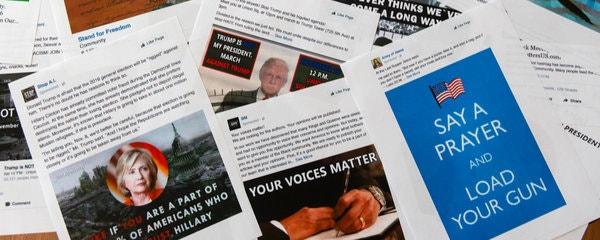Do we have too many political ads?
or just too many DIFFERENT political ads?

Facebook cannot fact-check political ads, because it is impossible. OK, so what do we do about it?
As far as Facebook and other social networks are concerned, the real, complete solution is not pointless “break-up” proposals. It is to make it easy for everybody to read and write on Facebook without being on Facebook.
In addition to that, however, there should also be a reform of all political advertising online, if not of advertising period. A good reform of this kind may be the one recently proposed by Professor S. Vaidhyanathan.
What is the real problem, again?
The problem is the “very core of the Facebook business model”, that is, as Vaidhyanathan explains, the fact that today there is no limit to “data collection and the use of personal data to ferry ads and other content to discrete segments of Facebook users”.
This is a problem because today two people in the same neighborhood, or even household, can receive [even very] different ads from the same candidate. And they may never realize that, maybe, at least one of them is being deliberately lied to.
Just end PERSONALIZED ads!
This data-driven obscurity “limits accountability and full deliberation”. But if the same political ads were to reach everyone in a state, district or even country, instead:
-
candidates could still craft specific messages for specific segments of voters (e.g. women, senior citizens, gun control advocates, whatever)
-
but since all voters who do not belong to those groups would also see those ads, candidates “could not get away with lies quite so easily”.
In practice, what laws should do is only to “restrict the targeting of political ads in any medium (from paper leaflets to TV) to the level of the electoral district”.
Besides fighting “fake news” such a change may have another, maybe even more important effect. Being forced to see what “the other side” really cares about and why may help a lot to contrast artificial political extremism and polarization.
Sounds really interesting, and (technically, of course) very easily feasible to me. What do you think?
Who writes this, why, and how to help
I am Marco Fioretti, tech writer and aspiring polymath doing human-digital research and popularization.
I do it because YOUR civil rights and the quality of YOUR life depend every year more on how software is used AROUND you.
To this end, I have already shared more than a million words on this blog, without any paywall or user tracking, and am sharing the next million through a newsletter, also without any paywall.
The more direct support I get, the more I can continue to inform for free parents, teachers, decision makers, and everybody else who should know more stuff like this. You can support me with paid subscriptions to my newsletter, donations via PayPal (mfioretti@nexaima.net) or LiberaPay, or in any of the other ways listed here.THANKS for your support!